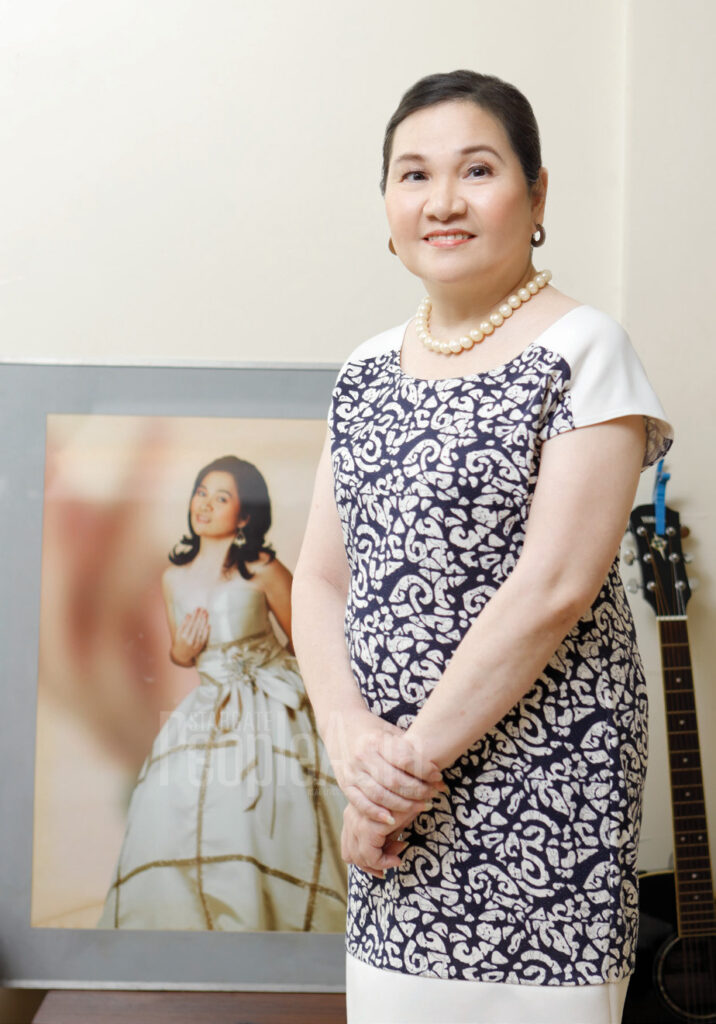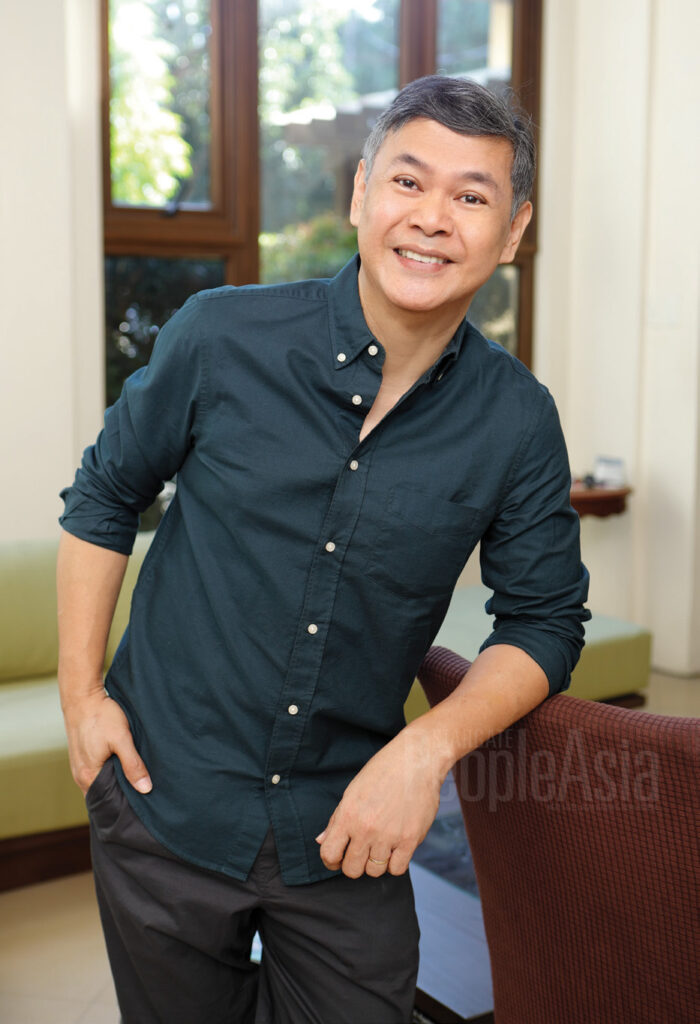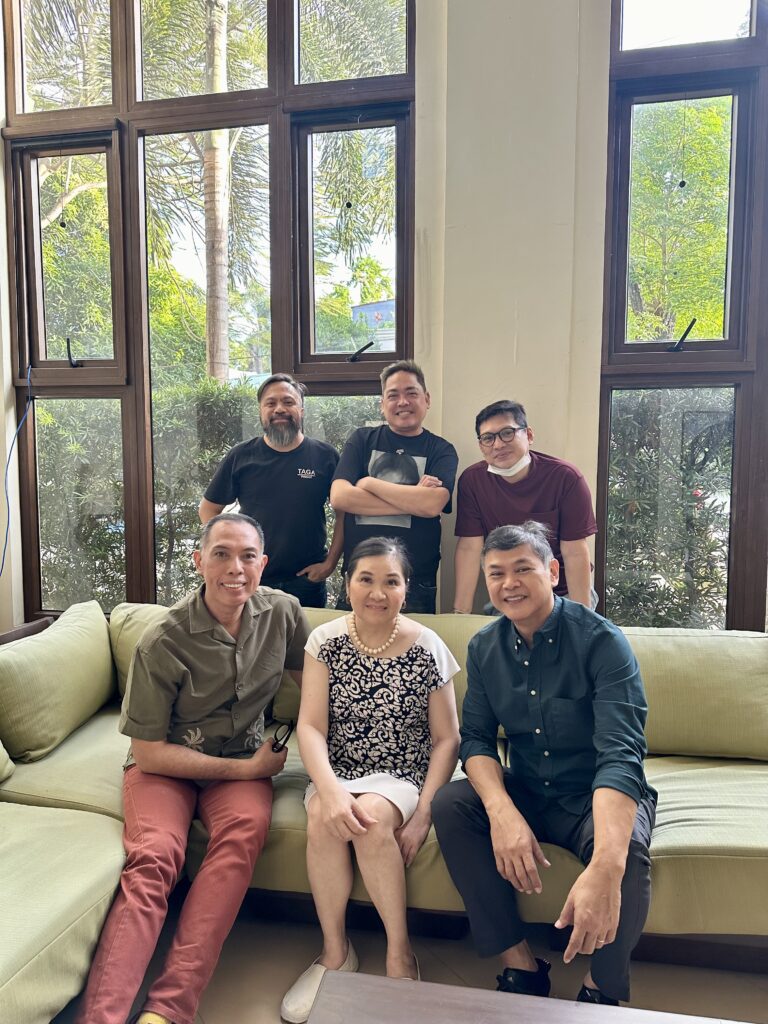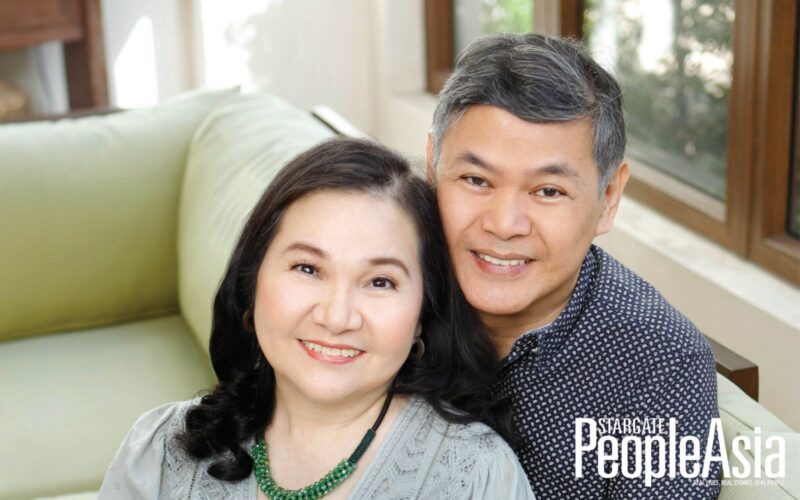BY ALEX Y. VERGARA
Aneurysm, cancer, going blind, witnessing the family home razed to the ground. Name it, Margie has experienced it. Yet, instead of losing their faith in God, she and husband, Chet, have completely surrendered themselves to Him. Come what may. Thy will be done.

— Margie Quimpo-Espino
As businessman Chet Espino sees it, his and wife Margie Quimpo-Espino’s love for each other has been further deepened by their shared Christian faith, where one virtue can’t exist without the other. Although the foundation of their 32-year marriage has always been strong, the indisputable bond between love and faith didn’t happen overnight. And that connection continues to be forged and strengthened to this day as the Espinos make one final stand whose outcome will be known even before the year is over.
“When I was much younger, I prayed to God to be able to meet a man who goes to church regularly, especially on Sundays,” Margie starts off. “Ganoon lang ka-simple. (It was that simple.) Aba, I was already going on dates with my seventh boyfriend, and I still hadn’t found that man. That was until I met Chet.”
Or so she thought. Chet, who also grew up in a Catholic home, didn’t take his faith seriously. The two met as young reporters for the same newspaper in the late ’80s. In his desire to impress Margie during the initial stages of their courtship, Chet found himself one Christmas season driving from their home in Las Piñas all the way to Quezon City to pick up Margie to go to simbang gabi (dawn masses).
“She invited me to hear Mass with her,” he says, smiling. “If I said yes, that would mean doing it every day for nine consecutive days. Pero, sige! (But okay, go!) I faked it. In the end, it was God who ended up ‘faking’ me. Shortly after, I started going regularly to Sunday Mass.”
His faith, including a deeper understanding of the Mass and certain Catholic beliefs, as well as his search for meaning has been further deepened when he joined Opus Dei in the mid aughts.
“I don’t think anybody would’ve given as much as he is giving now. Inisa-isa ko lahat ng naging boyfriend ko (I thought of all my past boyfriends), and they’re just not capable of that,” says Margie of Chet.
Spiritual journey
Their spiritual journey as a couple took on a whole new level when Margie went through a series of life-threatening health emergencies, which started in 2008. While covering a story in India, she had two aneurysms that left her on the brink of death. Chet dropped everything in Manila and flew to his unconscious wife’s side a day later. Despite the advances made by India in the field of medicine and surgery, Margie’s doctors didn’t give Chet any false hopes. His wife needed a miracle, and he knew it.
“While I was praying in a church in India, I told myself I’m never going to ask [the Lord] why this happened,” Chet, looking back during those difficult days, shares with PeopleAsia. “I will never ask why us because it’s not going to help. It is what it is. I just said, ‘Lord, I don’t know what’s happening. I don’t know what hit us. I don’t know how to handle this. I have no strength. You must help me.’”
God, in his mysterious ways, did respond, allowing Chet to bring home his ailing wife on a stretcher after she underwent numerous medical procedures, including coiling parts of her brain to stem the massive bleeding. Her treatment and hospitalization continued in the Philippines. At one point, she even went blind, albeit temporarily, the result of blood clots from her brain cascading down her eyes.
Their passage through India is chronicled in 88 Days in India: A Pilgrimage of Faith, Hope and Love, a slim tome that Chet wrote and published soon after their return to the Philippines sometime in 2009.
Before the book came out, Margie read through her husband’s work. Perhaps because her ailment involved the brain, she couldn’t remember anything before her trip to India and soon after she was discharged from the hospital in Faridabad. Chet considers this form of selective amnesia as one of God’s many gifts to them, as his wife, he says, was spared from further trauma.
“I don’t know why,” says Margie. “I was never reduced to tears while reading it.”
“Don’t even think of crying,” Chet butts in, teasing his wife. “I don’t want you to cry. ’Di ka pang drama (you’re not fit for drama). You can only do comedy. Just smile!”

— Chet Espino
At a crossroads
Less than four years later, in 2012, the Espinos and their three children were again at a crossroads, as Margie was diagnosed with stage 3 breast cancer. As if that wasn’t bad enough, their family home was razed to the ground even before she could finish her remaining cycles of chemotherapy. Chet wasn’t home when it happened. Margie and her three grown children and a maid managed to escape from the blaze with only the clothes on their backs.
“That God was singling us out never crossed my mind,” says Margie, matter-of-factly. Look at Job, the biblical character who went through all sorts of trials in the Old Testament. He had it worse, she adds, but not once did he complain.
Again, the Lord granted Margie a reprieve, as her cancer went into remission. But not once did Margie miss out on her annual bone scan except during the height of the lockdown in 2020. In January 2023, less than a month after Margie had her annual tests, including the bone scan, she contracted dengue, leaving her feverish and feeling all sorts of aches and pains.
But long after her fever had subsided, the pain persisted. They finally got their answer later that month when results of Margie’s latest bone scan came — her cancer was back, and this time it was stage 4. What was once confined to her breast and lymph nodes, had now metastasized to her bones.
Her oncologist recommended radiation. For the daily procedure to be more effective, Margie underwent further mapping to pinpoint where the lesions in her bones were. It took a while for the results to come out. Meanwhile, the pain Margie felt grew more intense by the day to the point that she couldn’t stand up anymore.
Spreading metastasis
Results revealed that the metastasis had spread to several of Margie’s ribs, near the spine, pelvis and shoulder.
“For the entire month of February (2023), she was undergoing daily radiation,” says Chet. She bravely went through it, but not without enduring its harsh side effects, including experiencing diarrhea and the eventual loss of electrolytes.
“One day, her face started to stiffen,” Chet, Margie’s primary caregiver, adds. “It was as if she was having seizures.” They found themselves back in the hospital where doctors further boosted her infusion of zoledronic acid to strengthen her bones. She also received regular hormone injections to slow down the growth and spread of cancer cells.
Of the many recurring procedures Margie has undergone, only the last two remain. She has opted to stop undergoing radiation soon after results of her most recent PET scan came out last October.
“The spread of cancer in her bones wasn’t arrested,” says Chet. “It even increased to now include her liver, lungs and possibly her brain, which only a CT scan, which we opted not to undergo, could reveal.”
She was left with two options: undergo another round of chemotherapy targeting her lungs, liver and bones. For her brain, assuming cancer was already there, she would have to go through further radiation. The second option was to shun further treatments. Rather than look and feel wasted from the harsh effects of these combined protocols, Margie, after years of going through the wringer, has chosen to do away with them.
Without any form of intervention, save for zoledronic acid infusion, hormone injections and a cocktail of strong painkillers, her doctors gave her, starting in October 2023, one year or less to live. The rather funny part was they offered her no guarantees either should she go through the whole shebang.
“Why would I seek further treatment just to delay the inevitable?” she reasons. “My cancer is already something that can’t be cured, except for a miracle, which I do believe in. Still, why prolong it? I won’t be able to talk to people. I won’t be myself. I’d be reduced to lying in bed all day, weak, bald and looking ugly.”
Margie, with almost child-like faith coupled with the tenacity of a martyr, sometimes foregoes pain killers, and offers her sufferings to the Lord for the benefit and redemption of others.
“I have nothing to give,” says Margie. “The only things I can give are prayers and my pain to help alleviate the suffering of others.”
But Chet had to put his foot down because intense physical pain also has its implications, including an elevated heart rate and blood pressure. “I know embracing pain and offering it to God are personal for her,” he says. “Jesus embraced his cross lovingly for you and me. But, in Margie’s case, it can’t go on indefinitely.”
“My intense longing to be with God now trumps everything,” says Margie. “I still think of my elderly parents and the grandchildren I have yet to see. But God has given me everything — my husband, my children, my sickness, the chance to live longer. I’m thankful.”
Her family’s wishes
But make no mistake about it. Had her family wanted her to seek further treatment, Margie would have gone through with it. But none of them wanted to see her suffer further. She and Chet are also in agreement: to ask God to give her more time would already be asking Him too much.
During a meeting Chet had with their children, minus Margie, Mark, their eldest child, who’s now married and living in the UK, framed the family’s situation, through the lens of Margie, very well: “Not seeking further treatment isn’t a form of surrender. It’s acceptance.”
“Margie isn’t making the decision not to get treatment out of surrender and hopelessness,” Chet concludes. “No, she’s embracing it.” In the context of what she went through in India, everything that happened to her after is a bonus.
Margie and Chet have every reason to feel grateful.
Photography by Dix Perez
Art direction by Dexter Francis De Vera
Hair, makeup and grooming by Eddie Mar Cabiltes






